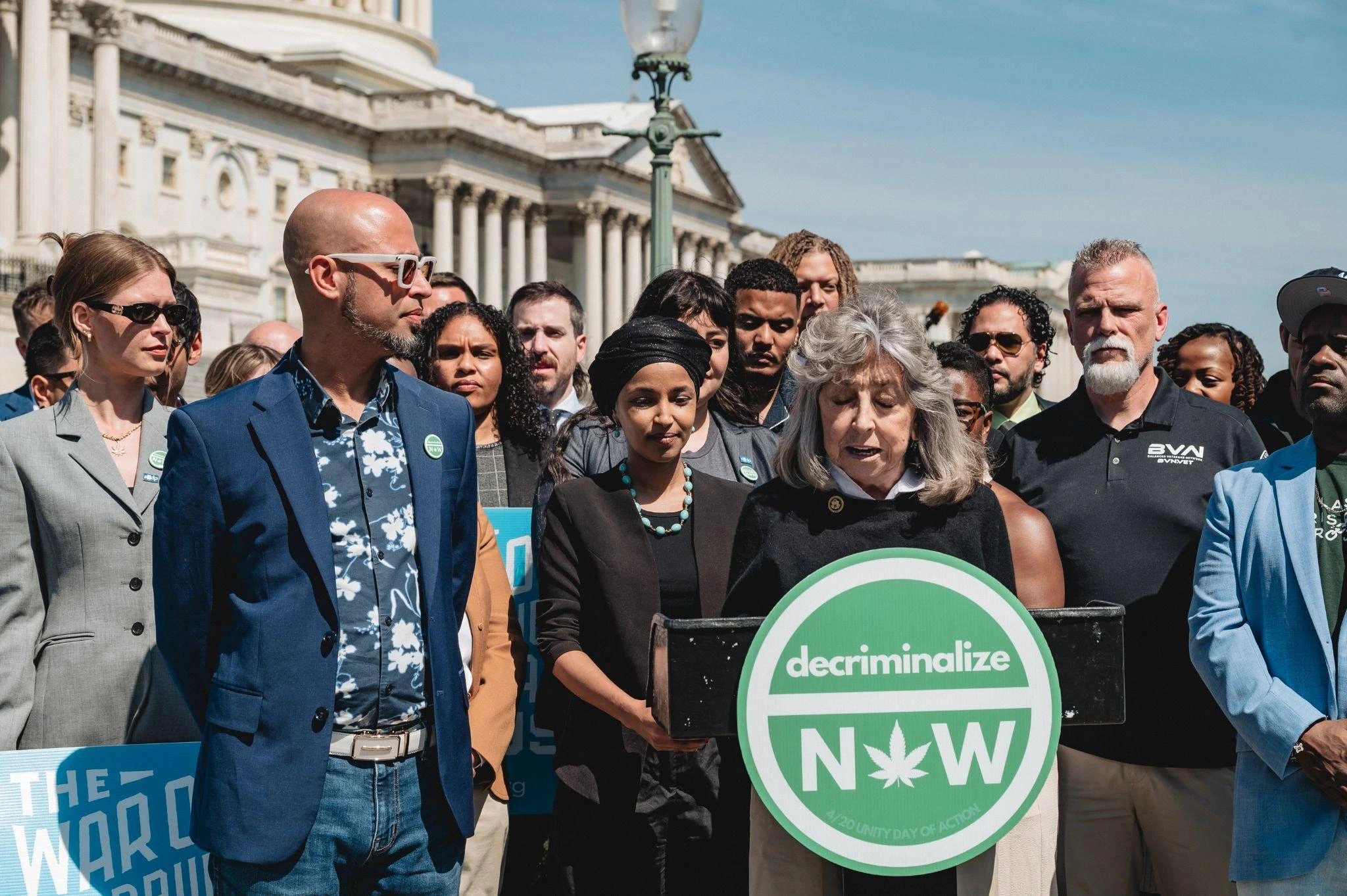DEA Rescheduling Hearing Postponed Indefinitely
As we’ve previously discussed, during President Biden’s term, he requested that his cabinet conduct an administrative review of cannabis’s classification under federal law.
As required by the federal Controlled Substances Act (CSA), the U.S. Health and Human Services (“HHS”) then conducted its own medical and scientific analysis, and recommended that cannabis be moved from Schedule I to Schedule III.
As a result, the U.S. Drug Enforcement Administration (DEA), the de facto decision-maker for drug scheduling decisions, published a proposed rule that, if finalized, would effectuate this rescheduling action. The public comment period for the proposed rule resulted in over 40,000 public comments—which were overwhelmingly in favor of moving cannabis to Schedule III (or descheduling altogether).
Thereafter, the DEA scheduled a hearing to permit interested parties to present testimony in favor of, or in opposition to, the proposed rule. However, widespread concerns developed regarding the fairness of the hearing. Specifically, the selection of hearing participants, which were handpicked by the DEA Administrator and overwhelmingly anti-rescheduling, the DEA’s apparent opposition to rescheduling, despite its legal assignment as the “proponent” of the rule, and alleged improper coordination between DEA and anti-rescheduling parties.
As a result, a group of parties motioned to remove the DEA as the “proponent” of the rule. The judge presiding over the hearing denied this request but granted the motion to appeal this decision to the DEA Administrator. As a result of the pending interlocutory appeal, the hearing, originally scheduled for January 21, 2025, has been postponed indefinitely.
The interlocutory appeal remains pending with the DEA Administrator, and there is no clear indication of what is to come. Moreover, as described below, the transition to a new presidential administration, and failure to appoint a new DEA Administrator, creates additional uncertainties and likely delays.
The New Trump Administration’s Take on Cannabis
During his 2024 presidential campaign, President Trump notably endorsed Florida’s Amendment 3 to effectuate legalization for adult-use, and vocalized support for further medical marijuana research, safe banking, and states’ rights.
However, President Trump has not made cannabis reform a priority since taking office, and the individuals appointed to leadership roles in the Trump Administration will likely have significant impact in shaping federal cannabis policy. Notably, the lack of ideological consistency within the Trump Administration creates uncertainties for predicting the future of cannabis policy reform.
During his confirmation hearings, Robert F. Kennedy Jr. (RFK Jr.) took an agnostic approach to cannabis policy, saying he would “defer” to DEA on the issue of marijuana rescheduling. However, many remain optimistic about RFK Jr.’s potential to influence positive reforms as HHS Secretary, based on his vocal support for cannabis decriminalization in the past.
In contrast, several other Trump nominees have a history of opposition or concern regarding cannabis reform efforts, including Attorney General Pat Bondi, FDA Commissioner Dr. Martin Makary, and Acting DEA Administrator Derek Maltz.
Trump’s most recent nominee for DEA Administrator, Terrance Cole, worked in law enforcement for the DEA for decades, and has consistently voiced concerns about the dangers of cannabis use, especially for youth. However, Cole has not voiced a clear position on the issue of DEA rescheduling, saying only that he would, “give the matter careful consideration after consulting with appropriate personnel within the Drug Enforcement Administration…and reviewing all relevant information” during his confirmation hearing.
The DEA itself has a long-standing prohibition-based approach to cannabis. Recently, the DEA published its 2025 National Drug Threat Assessment, declaring that the increase in state-level cannabis legalization has significantly expanded the illicit cannabis market, and raising concerns about high THC potency levels and consumer safety.
Likewise, DEA recently published content on its website provided by an anti-marijuana group for “National Prevention Week.” The content makes dubious claims, which have been debunked or at least are disputed by conflicting data, about the risks and impact of cannabis use, such as the “gateway drug” theory.
Bipartisan Efforts to Advance Cannabis Legislation
While the Trump Administration’s approach to cannabis remains unclear, significant efforts towards reform are underway in Congress.
Manzuri Law Associate Attorney, Callie Hoffmann (pictured left), was in DC last month for the second annual Cannabis Week of Unity, which mobilized the largest bipartisan coalition of cannabis advocates and industry leaders in support of cannabis policy reform. Specifically, the coalition lobbied in support of eleven active bills, which are briefly summarized below.
Evidence-Based Drug Policy Act: The Cannabis Week of Unity kicked off with a press conference (pictured above), where Congresswomen Titus and Omar, the Democratic Co-Chairs of the Congressional Cannabis Caucus, introduced the Evidence-Based Drug Policy Act of 2025.
This bill would repeal current legal restrictions, which prevent the Director of the National Office of Drug Control Policy (aka the “Drug Czar,” who serves as the executive branch’s drug policy advisor) from researching and/or supporting the removal of any substance, including marijuana, from Schedule I.
Gun Rights and Marijuana Act (GRAM Act): Current federal law prohibits firearm and ammunition sales to individuals that unlawfully consume controlled substances, including marijuana. This bill would remove this prohibition for individuals whose marijuana consumption is lawful under their state or tribal law.
Marijuana in Federally Assisted Housing Parity Act: This bill provides that access to federally assisted housing may not be denied on the basis of marijuana use, possession, sale, or manufacturing done in compliance with state law.
Moreover, the bill would prohibit the federal Department of Housing and Urban Development from prohibiting or discouraging the use, distribution, possession, sale, or manufacture of marijuana in federally assisted housing, done in compliance with state law.
Preparing Regulators Effectively for a Post-Prohibition Adult-Use Regulated Environment Act (PREPARE Act): This bill would direct the federal DOJ to establish the Commission on the Federal Regulation of Cannabis, which would research and advise on the development of federal cannabis policy reform.
Strengthening the Tenth Amendment Through Entrusting States Act (STATES Act): The STATES Act would federally legalize cannabis products in compliance with state law from the federal definition of “marijuana.”
This would exclude state-legal cannabis markets from the federal Controlled Substances Act and allow state-legal operators to engage in interstate commerce (between legal states).
Veterans Cannabis Use for Safe Healing Act: This bill would prohibit the Department of Veterans Affairs from denying veterans access to VA benefits based on their active patient status in a state-legal medical marijuana program. Moreover, the bill would require the VA to ensure that its health care providers discuss marijuana use with veteran-medical marijuana patients, and to record such use in the veteran’s medical records.
VA would also be directed to authorize its physicians and health care providers to provide medical marijuana recommendations to veterans that reside in states with approved medical programs.
Marijuana Opportunity Reinvestment and Expungement Act (MORE Act): The MORE Act would remove marijuana from the federal Controlled Substances Act, which would remove existing criminal penalties for the manufacture, distribution, or possession of marijuana.
The bill also includes equity provisions, such as community reinvestment programs and access to expungement for certain offenses.
Cannabis Administrative and Opportunity Act (CAOA): The CAOA would also federally decriminalize cannabis by removing it from the Controlled Substances Act. In contrast to the MORE Act, the CAOA would grant the FDA, ATF and TTB regulatory oversight over cannabis, regulating it more similarly to alcohol and tobacco.
The bill also includes automatic expungement provisions for non-violent federal cannabis offenses and, unlike the MORE Act, a sentence modification program for folks currently incarcerated for cannabis offenses.
States Reform Act (SRA): The SRA would also federally decriminalize cannabis by removing it from the Controlled Substances Act. However, rather than establish a federal commercial regulatory structure, the SRA would allow the states to determine their own regulations. Similar to alcohol regulation, the bill would allow states to maintain a prohibition on cannabis but would nonetheless permit interstate commerce. The SRA also includes sentence modification, expungement, and re-entry provisions.
Harnessing Opportunity by Pursuing Expungement Act (HOPE Act): The HOPE Act would permit the U.S. Department of Justice (DOJ) to provide grants to state and local governments to support expungement programs for state-level cannabis offenses. The bill would also require the DOJ to publish a report on the personal impact of a criminal cannabis record on those convicted and the costs of criminal cannabis incarceration on the state.
The Weldon Angelos Presidential Pardons Expungement Act: This bill would allow a person that has received a full presidential pardon to have that pardoned activity expunged from their record. To this end, the bill would create a district court-level program, where expungement cases would be considered and processed.
Manzuri Law
Cannabis industry veterans are no stranger to the risks and uncertainties that come with operating in this industry. Manzuri Law’s team of experienced cannabis attorneys has fought for legalization alongside its clients for nearly two decades and is now bringing that fight to the federal level.
We are hopeful that opportunities for federal reform are expanding, and that the future of the cannabis industry is bright. However, as federal—and state and local—cannabis regulations continue to evolve, it is imperative that cannabis operators stay informed and prepare to strategically adapt.


